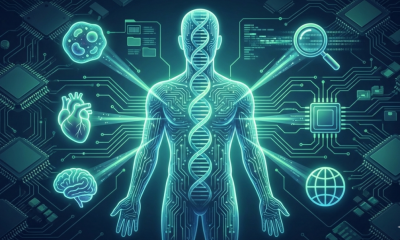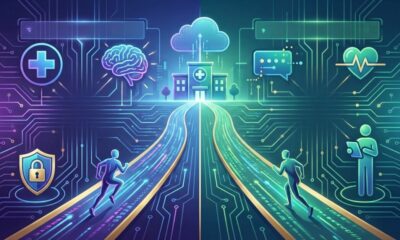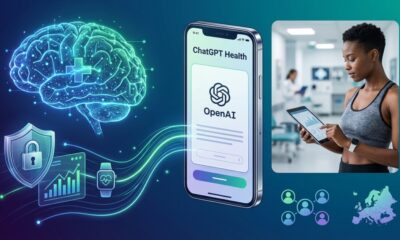Healthcare
Transforming Telehealth: How AI-Powered Virtual Consultations and Remote Monitoring Are Shaping the Future of Healthcare

As technology reshapes various industries, healthcare is undergoing some of the most significant transformations. Originally developed to monitor astronauts’ health in space, telehealth has emerged as a crucial healthcare tool, particularly during the COVID-19 pandemic. This development has now entered a new phase with the integration of Artificial Intelligence (AI). AI-powered virtual consultations and remote monitoring are increasingly becoming essential, effectively closing the gap between doctors and patients. This article explores how the integration of AI and telehealth is ushering in a new era of medical practices, transforming accessibility and efficiency of healthcare delivery.
What is Telehealth?
Telehealth refers to the delivery of healthcare services and information via telecommunications and digital communication technologies. This method allows patients to access medical care remotely, eliminating the need for in-person visits to a doctor’s office or hospital. Telehealth encompasses a broad range of services including virtual medical consultations, health education, remote monitoring of vital signs, and the transmission of medical imaging and health data. The primary goal of telehealth is to make healthcare more accessible, particularly for those in remote or underserved areas, and to enhance the convenience and efficiency of care management for both patients and providers.
The Evolution of Telehealth
Telehealth is not new; it began in the early 20th century with the use of radio and telephone to reach remote patients. The introduction of television and later the internet expanded its capabilities, incorporating video calls for consultations and more robust digital communication platforms. The COVID-19 pandemic significantly accelerated telehealth adoption, making it essential for managing non-emergency consultations safely. With recent AI integrations, telehealth has transitioned from a simple communication tool to a sophisticated platform capable of delivering personalized healthcare services.
AI-Powered Virtual Consultations and Remote Monitoring
Artificial Intelligence (AI) is transforming telehealth by enhancing its efficiency, accessibility, and personalization. AI-driven telehealth platforms, employing tools like chatbots, autonomously handle patient interactions, schedule appointments, and deliver medical information. Advanced AI algorithms are used to analyze comprehensive patient data, predict health outcomes, and notify healthcare providers of critical changes in a patient’s condition, enabling prompt medical responses. Here are some examples of widely used AI-powered telehealth systems:
- Ada Health: This AI-chatbot offers personalized health assessments and guides users to appropriate medical care levels. Ada employs sophisticated AI techniques, such as probabilistic reasoning and Bayesian methods, to simplify and accelerate the diagnostic process. It enables precise symptom assessment against a database containing 3,600 conditions and over 31,000 ICD-10 codes, encompassing 99.5% of all diagnosable conditions. With more than 13 million global users, Ada Health exemplifies transparent, explainable AI in healthcare, providing clear insights into the diagnostic process.
- OneRemission: This application is designed to support cancer survivors, fighters, and their supporters. It features an AI-powered chatbot that offers round-the-clock support, handling inquiries about cancer care and post-treatment lifestyle practices. Using cutting-edge AI technologies like natural language processing and machine learning, the chatbot quickly delivers information on nutrition, exercise, and stress management, and can escalate concerns to healthcare professionals as needed.
- Teladoc Health: This platform leverages AI to optimize telehealth appointment scheduling and enhance patient outcomes by facilitating connections between patients and doctors. It functions across various technologies, including mobile devices, the internet, and video and phone communications. The services provided span a broad spectrum of medical needs, from common ailments such as flu and respiratory infections to more severe, chronic conditions like cancer and congestive heart failure
- Babylon Health: Babylon offers a wide range of healthcare services via its AI-driven app, from assessing symptoms to conducting full virtual consultations. The app allows users to connect with doctors, nurses, and other healthcare professionals via phone or video calls. The app employs AI to track user behavior, which supports the early detection of health issues and enables timely preventive measures to enhance overall health.
- Biofourmis: This telehealth platform enhances healthcare delivery with its AI-driven analytics engine, Biovitals, that monitors real-time biomarkers. It allows for the early detection of changes in vital signs, promoting proactive healthcare interventions. It processes continuous physiological data, creating a personalized biometric signature for each patient. The system has successfully predicted heart failure decompensation up to 12 days in advance, improving patient care and bringing hospital-level services and clinical trials directly to patients’ homes.
Advantages of AI in Telehealth
The integration of AI into telehealth is bridging the gap between patients and healthcare providers, offering significant advantages that promise to reshape the future of medical practice. Some of the advantages include:
- Enhanced Quality of Consultations: AI provides personalized, efficient, and consistent medical advice, improving the accuracy of treatments and reducing variability in care.
- Predictive Insights: AI’s ability to process large datasets enables it to anticipate disease progression, identify high-risk patients, and recommend preventative measures. Systems like Biofourmis’ Biovitals Analytics Engine process physiological data to predict events like heart failure decompensation days in advance, allowing for early intervention and potentially preventing hospital admissions.
- Improved Patient Engagement and Education: AI-driven chatbots and virtual assistants, such as Ada Health and OneRemission, interact with patients to provide health education, answer queries, and guide them through their healthcare journey. This not only enhances patient knowledge and engagement but also ensures that patients receive consistent support and guidance.
- Operational Efficiency in Healthcare Delivery: By automating routine tasks such as scheduling appointments and processing patient inquiries, AI allows healthcare facilities to optimize their operations and focus more resources on critical care activities. This efficiency gain reduces overhead costs and improves service delivery.
The Bottom Line
The integration of Artificial Intelligence (AI) with telehealth is transforming healthcare by enhancing accessibility, efficiency, and personalization. AI-powered systems, such as Ada Health, OneRemission, Teladoc Health, Babylon Health, and Biofourmis, are transforming how healthcare is delivered by providing advanced diagnostics, personalized consultations, and continuous remote monitoring. This integration not only improves the quality of healthcare consultations but also enables predictive insights that can anticipate disease progression and mitigate risks, thereby increasing operational efficiency and reducing healthcare costs. As these technologies evolve, they promise to bridge the gap between patients and providers, making healthcare more accessible and effective, particularly for underserved population.












